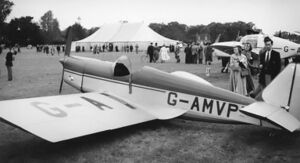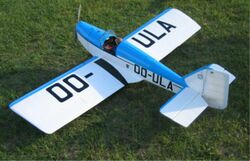Engineering:Avions Fairey Junior
| Tipsy Junior | |
|---|---|

| |
| Tipsy Junior G-AMVP at a UK airshow in 1953 | |
| Role | Sports plane |
| Manufacturer | Avions Fairey |
| Designer | Ernest Oscar Tips |
| First flight | 30 June 1947 |
| Number built | 2 |
The Avions Fairey Junior, also known as the Tipsy Junior was a single-seat light aircraft built in Belgium following World War II.
Development
The Junior was one of a series of light aircraft[1] designed by and named after E.O.Tips of Fairey Aviation's Belgian subsidiary, Avions Fairey. Of wood and fabric construction, it was a conventional, low-wing monoplane with a tailwheel undercarriage and a single seat, open cockpit,[2] though there was the option of a bubble hood.[3] The constant chord wings were almost square ended and the tailplane, fin and rudder also angular. Both completed aircraft were initially powered by the 36 hp (27 kW) Aeronca JAP J-99 engine, later replaced by the more powerful, 62 hp (46 kW) Walter Mikron 2.[2][4]
The Junior, registered OO-TIT, flew for the first time on 30 June 1947 from Gosselies in Belgium.[3]
Operational history
The first Junior was written off after a hard landing in 1948.[5]
The second example (construction number J.111, registration OO-ULA) was bought by Fairey and taken to England in 1953, where it was registered as G-AMVP.[2][4] In 1957, it was used in a publicity stunt when Fairey test pilot Peter Twiss landed it on the aircraft carrier HMS Ark Royal. For part of its time it had the bubble canopy. Rebuilt after a long time in storage following a forced landing in 1993,[5] it flew again late in 2006.[5] It had a minor landing accident in 2008[6] but had a permit to fly until May 2009.[7]
The Junior did not sell, and the third airframe was cancelled before completion. It was purchased incomplete by Fairey in 1961 and has been under construction in the hands of a number of owners in the intervening years, but never finished.[5]
Specifications
Data from British Civil Aircraft 1919-59 Vol.II.[2]
General characteristics
- Crew: 1
- Length: 5.65 m (18 ft 6 in)
- Wingspan: 6.9 m (22 ft 8 in)
- Height: 1.48 m (4 ft 10 in)
- Wing area: 10.5 m2 (113 sq ft) [5]
- Empty weight: 220 kg (485 lb)
- Gross weight: 350 kg (772 lb)
- Powerplant: 1 × Walter Mikron II 4-cylinder air-cooled inverted in-line piston engine, 46 kW (62 hp)
- Propellers: 2-bladed fixed pitch propeller
Performance
- Maximum speed: 174 km/h (108 mph, 94 kn)
- Cruise speed: 158 km/h (98 mph, 85 kn)
- Range: 430 km (270 mi, 230 nmi)
- Service ceiling: 1,800 m (5,900 ft)
References
- ↑ Taylor 1974, pp. 39–44
- ↑ 2.0 2.1 2.2 2.3 Jackson 1960, p. 448
- ↑ 3.0 3.1 "Tipsy Junior: Advanced Performance of Diminutive Single-seater on 60 h.p.". Flight: 115. 31 July 1947. http://www.flightglobal.com/pdfarchive/view/1947/1947%20-%201261.html.
- ↑ 4.0 4.1 Taylor 1974, pp. 44
- ↑ 5.0 5.1 5.2 5.3 5.4 The Ultimate Tipsy Site
- ↑ G-AMVP accident
- ↑ CAA G-AMVP
Bibliography
- Taylor, H.O. (1974). Fairey Aircraft since 1915. London: Putnam Publishing. ISBN 0-370-00065-X.
- Jackson, A.J. (1960). British Civil Aircraft 1919-59 Vol.II. London: Putnam Publishing.
- Taylor, Michael J. H. (1989). Jane's Encyclopedia of Aviation. London: Studio Editions. pp. 90.
- Simpson, R. W. (1995). Airlife's General Aviation. Shrewsbury: Airlife Publishing. pp. 387.
 |


